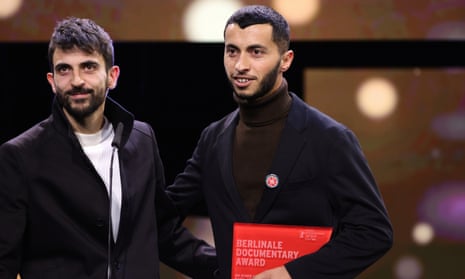An Israeli film-maker who won one of the top prizes at the Berlin film festival has said German officials’ description of the awards ceremony as “antisemitic” has led to death threats and the physical intimidation of family members, causing him to hold off plans to return to Israel.
Yuval Abraham, 29, was on Saturday awarded the Berlinale’s best documentary award for No Other Land, which charts the eradication of Palestinian villages in Masafer Yatta in the West Bank.
Abraham’s acceptance speech, in which he decried a “situation of apartheid” and called for a ceasefire in Gaza, was one of several moments during the closing ceremony in which film-makers expressed solidarity with Palestine. It sparked an outcry in German media the following day, with several politicians alleging the speeches had been “antisemitic”.
“To stand on German soil as the son of Holocaust survivors and call for a ceasefire – and to then be labelled as antisemitic is not only outrageous, it is also literally putting Jewish lives in danger,” Abraham told the Guardian.
“I don’t know what Germany is trying to do with us,” he added. “If this is Germany’s way of dealing with its guilt over the Holocaust, they are emptying it of all meaning.”
Abraham said he had planned to return to Israel the day after the closing ceremony, but that he changed his plans during a stop-off in Greece, when he learned that Israeli media outlets were describing his speech as antisemitic, with some citing German officials.
As well as receiving death threats on social media, Abraham said several individuals turned up at his family members’ home in Israel, causing them to vacate the premises out of fear for their safety.
Abraham, whose grandmother was born in a concentration camp and most of whose father’s family was killed in the Holocaust, said: “You can criticise our acceptance speech, you can say that we should have mentioned the events of 7 October – all that is legitimate. But Germany is weaponising a term that was designed to protect Jews, not only to silence Palestinians but also to silence Jews and Israelis who are critical of the occupation and use the word apartheid. This is also dangerous because it devalues the term antisemitism.”
Abraham’s Palestinian film-making partner, Basel Adra, said during Saturday’s ceremony that he struggled to celebrate his film’s success while people in Gaza were “being slaughtered and massacred”, and urged Germany to cease arms exports to Israel. Abraham said he was concerned for the safety of Adra, who has since returned to his village in the West Bank, which is surrounded by Israeli settlements.
“Basel lives under occupation and the army or settlers can take revenge against him at any moment,” Abraham said. “He is in much greater danger than me.”
The backlash against the Berlinale ceremony in Germany also involved calls for the resignation of the minister of state for culture, Green party politician Claudia Roth, who was seen applauding Abraham and Adra’s speech in footage of the event.
Roth’s office tried to clarify that she had clapped at the Israeli but not the Palestinian half of the duo in a statement on X on Monday. Her applause “was directed at the Jewish-Israeli journalist and film-maker Yuval Abraham, who spoke out in favour of a political solution and a peaceful coexistence in the region”. Roth’s office also said that reports of death threats against Abraham were “alarming”.
Abraham said: “This tactic of divide and conquer feels more familiar from military occupations. We will stand united, because our film is about envisioning a future where we can live together with equal rights.”
